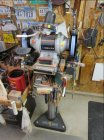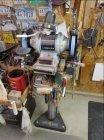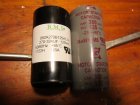odie
TOTW Team
- Joined
- Dec 22, 2006
- Messages
- 7,117
- Likes
- 9,850
For the first time this evening, I had some trouble starting my grinder. When flipping the switch, it buzzed and didn't rotate the grind wheels. A couple times the wheels went backwards for about an inch at the wheel surface and stopped. If I gave the wheels a spin, and then flipped the switch, it would come up to speed, but the acceleration was slow.
Is this a bad thing to give the wheels a spin, and then flip the switch?
The information on the motor plate is as follows:
Delta model 23-725
1800 rpm
3/4 hp
1ph 10a
serial # 2007 29-YL-1899
It's on a 110v circuit.
Will the motor need a rebuild, or is this a simple part replacement? (capacitor maybe?)
I haven't removed the grinder from it's stand, so haven't looked into the internal components of the motor base yet. All this happened about 1/2hr ago, as I type, so thought I'd get some advice before I start to break the grinder and set-up down.
Any thoughts are appreciated.
-----odie-----

Is this a bad thing to give the wheels a spin, and then flip the switch?
The information on the motor plate is as follows:
Delta model 23-725
1800 rpm
3/4 hp
1ph 10a
serial # 2007 29-YL-1899
It's on a 110v circuit.
Will the motor need a rebuild, or is this a simple part replacement? (capacitor maybe?)
I haven't removed the grinder from it's stand, so haven't looked into the internal components of the motor base yet. All this happened about 1/2hr ago, as I type, so thought I'd get some advice before I start to break the grinder and set-up down.
Any thoughts are appreciated.
-----odie-----








